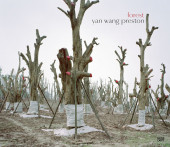 Neuerscheinungen 2018Stand: 2020-02-01 |
Schnellsuche
ISBN/Stichwort/Autor
|
Herderstraße 10
10625 Berlin
Tel.: 030 315 714 16
Fax 030 315 714 14
info@buchspektrum.de |

Nadine Barth, Zelda Cheatle, Yan Wang Preston
(Beteiligte)
Yan Wang Preston
Forest
Fotos: Preston, Yan Wang; Text: Cheatle, Zelda; Barth, Nadine
2018. 128 S. m. 60 Abb. 260 x 300 mm
Verlag/Jahr: HATJE CANTZ VERLAG 2018
ISBN: 3-7757-4375-8 (3775743758)
Neue ISBN: 978-3-7757-4375-4 (9783775743754)
Preis und Lieferzeit: Bitte klicken
Wer Bäume pflanzt, der wurzelt. Und wer Bäume umpflanzt? Yan Wang Preston ( 1976) machte 2013 während eines Langzeitfotoprojektes entlang des Jangtsekiang eine einschneidende Beobachtung: Im kleinen Dorf Xialiu stand ein über 300 Jahre alter Baum in voller Pracht, mitten im Leben einer Dorfgemeinschaft, die zum Zeitpunkt von Yans Besuch dazu angehalten wurde, für den Bau eines Staudamms umzusiedeln. Drei Monate später war von Dorf und Baum nichts mehr zu sehen. Die Bewohner siedelten an den Berg. Und der 70 Tonnen schwere Baum? Er wurde für 10,000 US-Dollar an ein Hotel in der nächstgrößeren Stadt Binchuan verkauft. Seiner Äste und Blätter komplett entledigt, in Plastik bandagiert, fand ihn Yan an dem tatsächlich noch im Rohbau stehenden Hotel vor - wie eine lebendige Skulptur, die sich ihrer neuen Umgebung erst gewahr werden sollte. In China, dem Land, in dem die Städte in die Höhe sprießen, boomt das Transplantationsgeschäft mit der Natur. In der Fotoserie Forest spürt Preston viele weitere entwurzelte Kreaturen inmitten der Betonwüsten auf und hinterfragt unser Gefühl von Heimat nochmals neu.
Mein Freund, der Baum, ist nicht tot, er ist nur umgezogen
Planting trees, you put down roots. And what about those who dig them up? In 2013, during a long-term photography project along the Yangtze river, Yan Wang Preston ( 1976) made an incisive observation: in the small village of Xialiu stood an over three-hundred-year-old tree in all of its glory, right in the center of a community that was, at the time of Yans visit, being coerced into moving so that a dam could be built in that location. Three months later, no trace of the village or the tree could be seen. The residents had moved up the mountain. And the seventy-ton tree? It was sold for ten thousand American dollars to a hotel in the nearest large city, Binchuan. Yan found the tree, divested of all its branches and leaves and bandaged in plastic, inside the skeleton of the hotel, which was still under constructionlike a living sculpture that has yet to become cognizant of its new surroundings. In China, the country where cities are springing up, transplanting nature is big business. In the photo series Forest Preston tracks down many uprooted creatures that are now in concrete deserts, once again questioning our sense of the meaning of homeland.Yan Wang Preston is the winner of the Syngenta Photography Award.


